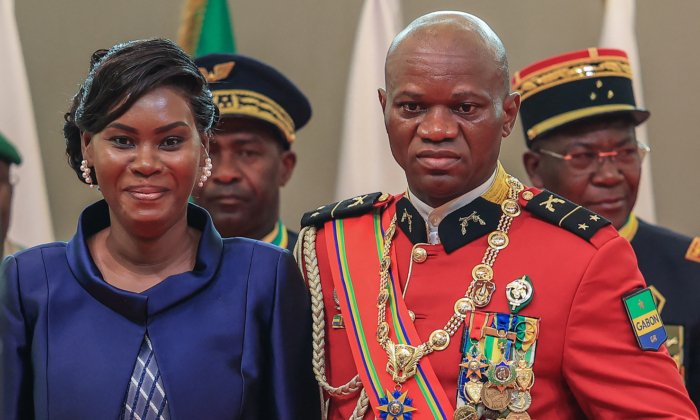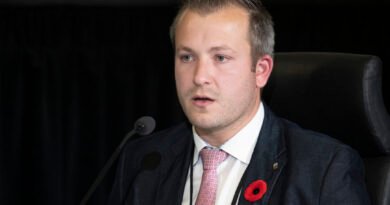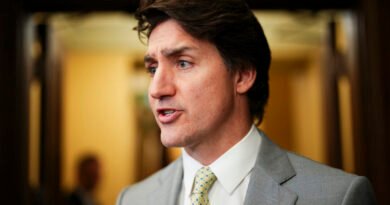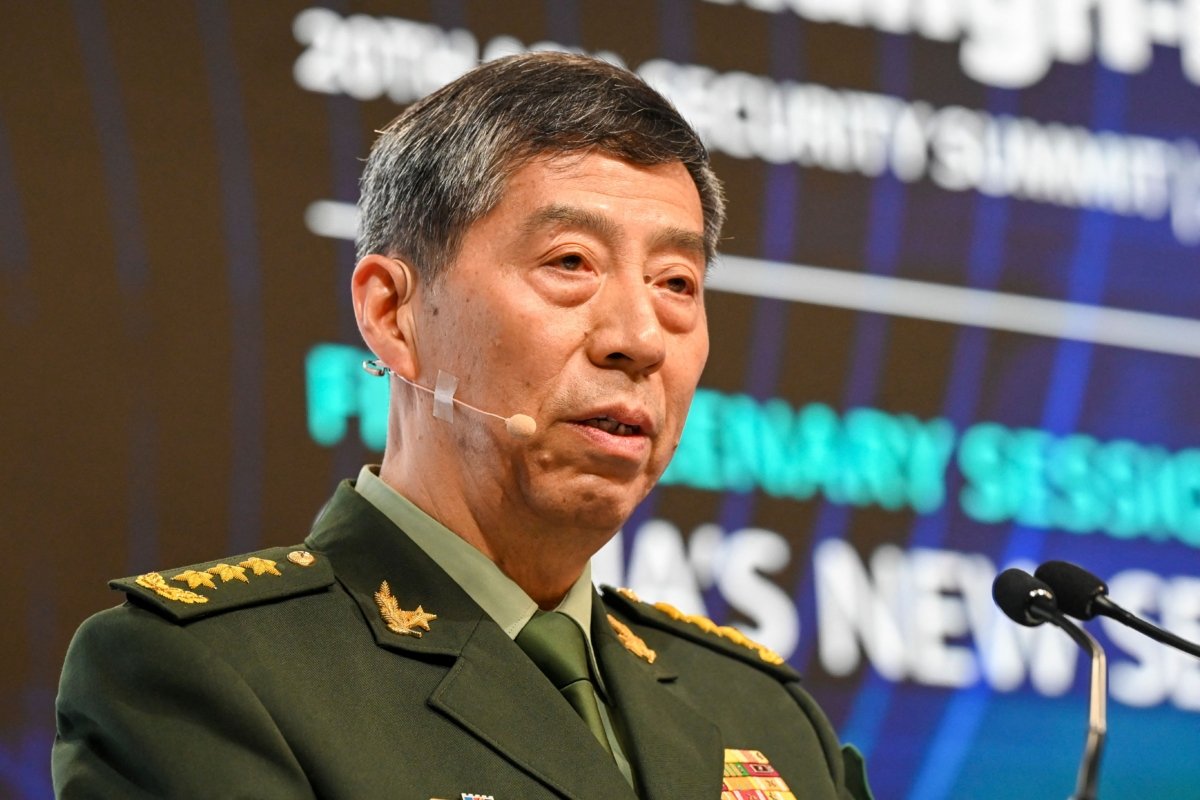‘Interim President’ Assumes Power in Gabon Following Coup
When journalist Estra Nelle Ovono Ndong, 37, woke up on early Aug. 30 to the news that generals in his tiny oil-rich central African nation of Gabon seized power from President Ali Bongo Odimba, all he could do was go into his room, close the door, and pray to God. Having confirmed the news with neighbors minutes later, Mr. Ovono immediately joined thousands of other Gabonese in the streets of Port-Gentil to celebrate the bloodless coup.
“Like most compatriots, I am happy, but at the same time, I am a little bit scared because with [the military], it’s never easy,” said Mr. Ovono, who runs the Facebook news and information platform ENON INFOS. His wish is for the wind of change to sweep across the neighboring countries of Cameroon, Equatorial Guinea, and the Republic of Congo, which have been ruled by the same leaders for decades.
“If a military coup was the only way to liberate these peoples ruled by these dynasties, why not follow the Gabonese example while preserving human life?” Mr. Owono told The Epoch Times. “I expect from the new regime the recognition of the victory of the people who bestowed their confidence on the opposition through the ballot box. I want Gabon to return to civilian rule as soon as possible.”
Related Stories
The military takeover on Aug. 30 came minutes after Gabon’s election body announced 64-year-old President Ali Bongo had won a third term, which was to extend the Bongo family’s more than half-century in power. The opposition had denounced the Aug. 26 vote as fraudulent—a claim Mr. Bongo’s campaign denied. Hours after seizing power and putting Mr. Bongo under house arrest, the officers, calling themselves the Committee of Transition and the Restoration of Institutions, announced the annulment of the election results, border closures, and the dissolution of state institutions.
Mr. Bongo’s son and close adviser, Noureddin Bongo Valentin, his chief of staff, lan Ghislain Ngoulou, as well as his deputy, two other presidential advisers, and the two top officials in the ruling Gabonese Democratic Party (PDG) were arrested and accused of treason, embezzlement, corruption, falsifying the president’s signature, among other allegations.
The ringleader, who before the coup was head of the Gabonese Republican Guard, Gen. Brice Clotaire Oligui Nguema, is set to be sworn in as “transitional president” on Sept. 4 at the constitutional court. Ahead of the swearing-in ceremony, the military leadership has reopened the country’s borders.
Gabonese security forces are seen after a group of Gabonese military officers appeared on television announcing they were “putting an end to the current regime” and scrapping official election results that had handed another term to veteran President Ali Bongo Ondimba, in Libreville, on Aug. 30, 2023. (AFP via Getty Images)
‘Not Surprising’
Professor Freedom Chukwudi Onuoha, the coordinator of security, violence, and conflict research group at the University of Nigeria, Nsukka, isn’t the least surprised by the coup in Gabon except for one thing: the man at the center of the junta is Mr. Bongo’s very own cousin.
“The coup is a brutal reminder that some of the fragile states in the ECCAS [Economic Community of Central African States] sub-region are very much prone to experiencing coup if proactive actions are not taken,” Mr. Onuoha told The Epoch Times.
“It is not surprising that other sit-tight dictators, such as Biya of Cameroon and Kagame of Rwanda, have hurriedly effected some changes in the military formation in the form of unplanned retirement of military officers to prevent such usurpation of power,” he said. “Growing frustration over governance failures, undemocratic tendencies in the form of manipulated elections, and rising anti-French sentiments appear to be some of the major factors in the incidence of recent coups in Africa.”
Mr. Bongo came to power in 2009 following the death of his father, El Hadj Omar Bongo Ondimba, who had ruled the country with an iron fist for 42 years. Violent unrest erupted after Mr. Ali Bongo’s disputed 2016 election victory. In 2018, he suffered a stroke, which sidelined him for almost a year and led to calls for him to step down. The following year, a failed coup attempt saw mutinying soldiers sent to prison.
‘Change Won’t Come Overnight’
The coupists have justified the latest coup on “a severe institutional, political, economic, and social crisis,” which they say the country was subjected to, adding that the Aug. 26 vote was not credible.
Manu Lekunze, a lecturer in International Relations at the University of Aberdeen, United Kingdom, said the ordinary Gabonese should expect “very little” from the leadership change, further likening it to “putting new wine into an old wineskin.”
“This is intra-regime change and not a regime change in itself—the man on the street might not feel much change in their daily lives,” Mr. Manu told The Epoch Times.
“Because of the longevity of the regime, one can assume that they have some kind of a winning recipe on how to stay in power,” he said. “All the elite in Gabon are somehow related to the Bongo family. Change won’t come overnight. Democracy may only return in 10 to 20 years’ time.”
Junta leader, Gen. Nguema, was once an aide-de-camp of late President Omar Bongo and later, head of the powerful elite military team in charge of Mr. Ali Bongo’s security, the Gabon Republican guard. Gen. Nguema carried out some security reforms that helped Ali strengthen his grip on power.
“He is believed to have strong contacts with the French, held diplomatic posts in other francophone states like Algeria and Morocco, and some notable investments in U.S. real estate,” said Mr. Onuoha.
“These and other contacts, coupled with his longstanding experience in knitting security arrangements for protection of high-value politicians, are critical enablers that he can easily leverage to strengthen his own grip on power sooner than most people are prepared to accept,” he told The Epoch Times.
“But more importantly, is the genuine concern of his rise and reign translating to a continuation of the ‘Gabongos’ system, a moniker derived from the fusing of the word Gabon and Bongo to construct a dynastic rule.”
Like Mr. Manu, Mr. Onuoha hints that the Gabonese may not see the return to democratic rule any time soon. Instead, he says, there may just be a transition of Gen. Nguema into a civilian head, at worst, or a transition of power to a person he prefers, at best.
“Depending on [the] constellation of forces and the desperation to consolidate his power, he may undertake domestic and foreign policies that will whittle down the influence of France as a masterstroke to garner popular support at home and quickly consolidate power in an environment already characterized by growing anti-French sentiments in West and Central Africa,” according to Mr. Onuoha.
Groups, Countries Condemn Coup
Central Africa’s political bloc, ECCAS, has condemned the coup in a statement, announcing an “imminent” meeting of heads of state to determine how to respond. The African Union has also condemned the military takeover, calling on the military to ensure the safety of Mr. Bongo and his family. It also announced it was “immediately” suspending the participation of Gabon in all its activities, organs, and institutions.
The United Nations Secretary-General also “firmly condemned” the coup while acknowledging that “serious infringements of fundamental freedoms” appear to have taken place during elections at the weekend.
China and Russia expressed hopes for a swift return to stability, while France, Gabon’s former colonial ruler, which has troops stationed there, equally condemned the coup. If successful, the Gabon coup would be the eighth in West and Central Africa since 2020.
The most recent coup—in Niger—was in July. Military officers have also seized power in Mali, Guinea, Burkina Faso, and Chad, erasing democratic gains since the 1990s and raising fear among foreign powers with strategic interests in the region.
“The population that should have protested against military coups are not protesting; instead, they are celebrating,” said Mr. Manu. “We have also seen that the international community and the international organizations that should reject coups instead just make public statements and follow them with no action.”
China, Russia Will ‘Gain More Inroads Into Gabon’
“So long as the people don’t protest and the international community doesn’t act, nothing will stop a coup in any part of Africa today. With this, militaries can more or less do as they wish,” he said.
Mr. Onuoha warned that every sudden change of government in Africa—especially through military intervention—only opens an opportunity for “external contestation” for influence in the new space in furtherance of their national interests. China and Russia
Source link




